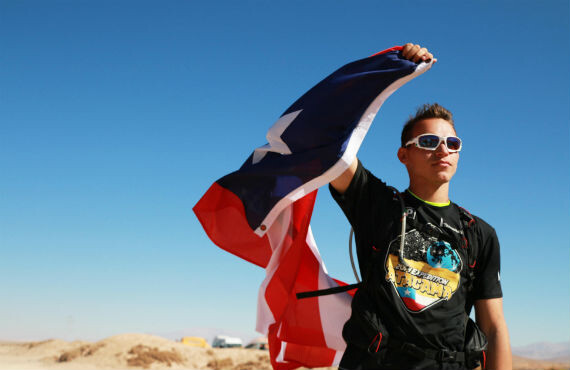Penn Student Jesús Pérez’s Challenging Feat Inspires Himself and Others
After training for months and then running the equivalent of nearly six marathons in six consecutive days in the Atacama Desert in Chile, University of Pennsylvania student Jesús Pérez now feels empowered to tackle any challenge he encounters.
Pérez, a rising junior in the College, participated in an expedition in the world’s driest desert as a youth ambassador through the educational organization impossible2Possible.
The group, also known as “i2P,” gives participants a chance to explore socially and environmentally sensitive regions during two-week expeditions.
In January, Pérez began training for the May event. A wrestler in high school, he had never run long distances. As president of his class at Penn, Pérez had a full schedule already, but he took on the challenge and began preparing for the expedition.
“As I went through the training, it became a passion for me,” says Pérez. “It was a good way to de-stress. I’d run down by the Schuylkill River in the morning.”
Pérez, a native of San Juan, Puerto Rico, whose family moved to New Orleans when he was in high school, is the only athlete from the United States selected to participate in the Atacama expedition. Two of the other participants are from Canada, along with one from Italy and one from New Zealand. Only one member of the group had run a marathon before. Now, they were going to run nearly 26 miles every day for six straight days.
“We were all coming into it very nervous and very anxious,” says Pérez, “but also very excited because we all know other people have done it in the past. And we know that we had it within us to finish it.”
On his first day running in the desert, Pérez suffered with cramps and dehydration. After replenishing with fluids, resting and getting approval from the group’s medical professionals, he was running again the next day.
“We ran through sand, we ran on asphalt,” he says. “We ran along railroad tracks. We ran through sandy stones. At one point, we ran through salt flats, which was like running through glass.”
The educational component for i2P expedition was an astronomy program incorporating the origins of the universe, the galaxies and planets and life on other planets. Atacama’s desert conditions, its high altitude and little cloud cover make it an ideal place for observing the sky.
“When the sky is very dark, you can see every tiny, little star,” says Pérez. “You can see the hazy part of the Milky Way, which was absolutely stunning.”
Pérez and his group shared their experiences in live video conferencing sessions with grade school and high school students in classrooms around the world.
In response to questions, “we’d say we saw some fossils in the desert. We saw a sandstorm,” says Pérez. “We’d tell them all about this, and the point is to inspire them and that they can be empowered to do whatever they want to do.”
Pérez’s feat not only helped inspire the young students, it also left him feeling more confident.
“I feel that I’ve run 136 miles in the middle of the desert, and nothing seems hard now,” he says. “This experience applies to so many things in life in general about overcoming obstacles, being resilient and just pulling through and pushing yourself to the limit.”
Pérez, who eventually aspires to work in public policy, plans to attend law school after he graduates from Penn in 2016.








